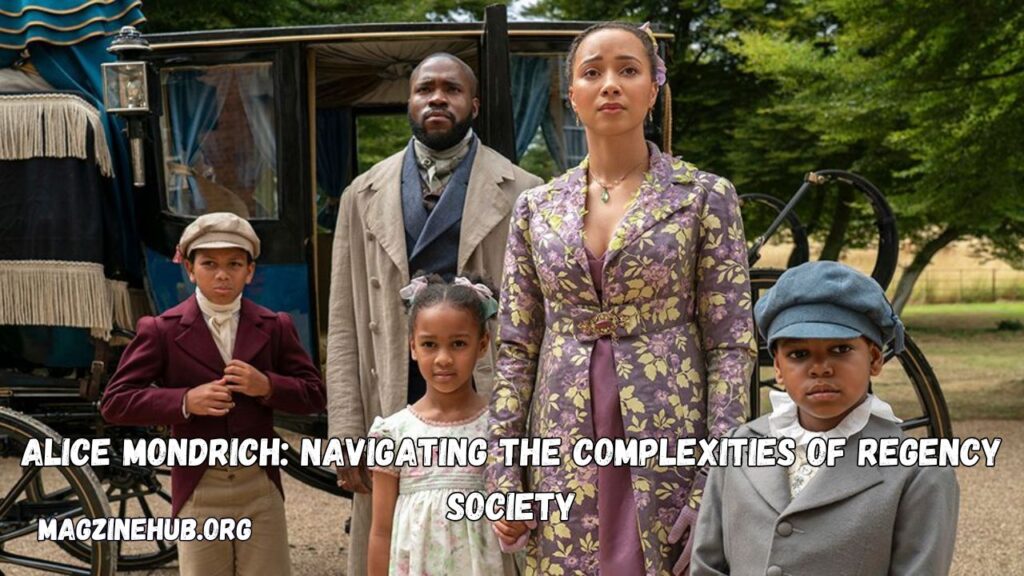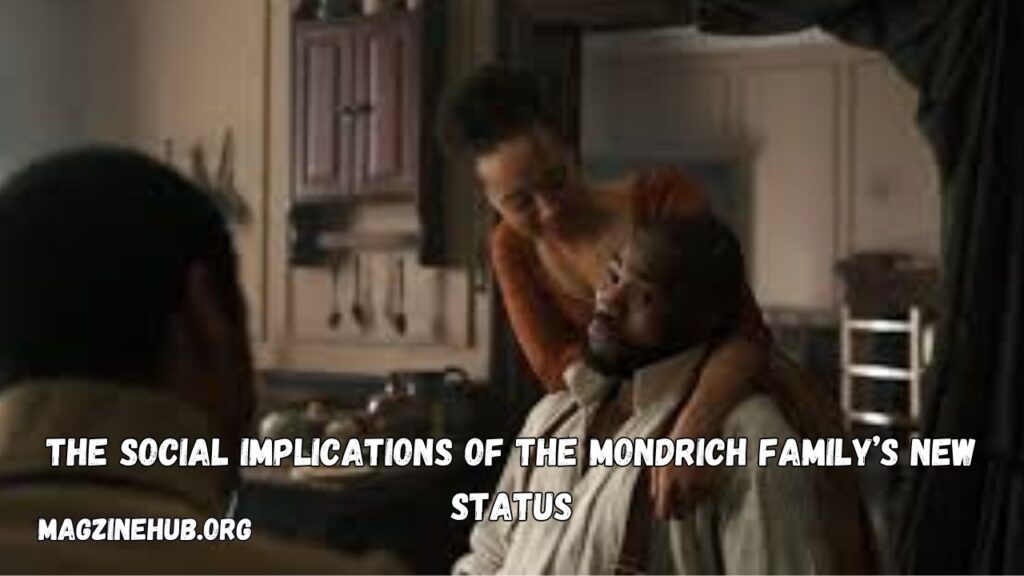Explore the roles of Lord and Lady Kent in Bridgerton Season 3, uncovering the Mondrich family’s social rise, the intricacies of Regency inheritance laws, and the broader implications for the ton. Discover how these new characters shape the drama of the latest season.’
Table of Contents
Introduction: Unraveling the Mystery of Lord and Lady Kent in Bridgerton Season 3
The third season of Bridgerton introduces new dynamics and characters that add depth to the intricate social fabric of the Regency era. Among these are the titles of Lord and Lady Kent, which become central to the storyline of the Mondrich family—a family that has intrigued viewers since their initial appearance. While the Kent title’s sudden emergence might seem like a minor subplot, it is, in fact, a significant development that highlights the rigid class structures, inheritance laws, and social mobility of the time. This article provides an in-depth exploration of who Lord and Lady Kent are, how their titles impact the Mondrich family, and what these changes signify in the broader context of Bridgerton.
The Mondrich Family: From Humble Beginnings to the Heights of the Ton
Will Mondrich: The Boxer Who Became a Gentleman
Will Mondrich, portrayed by Martins Imhangbe, is one of the more intriguing characters in Bridgerton. Introduced as a close friend of Simon Basset, the Duke of Hastings, Will’s character initially represents the lower echelons of society—an accomplished boxer striving to provide for his family. However, by Season 3, Will has transitioned into a new role as the owner of a gentlemen’s club, a business that brings him into closer contact with the ton.
This transformation is more than just a change in profession; it reflects Will’s ongoing struggle with identity and belonging. In a society where birthright often dictates one’s fate, Will’s rise to prominence through his own merits is both commendable and fraught with challenges. The introduction of the Kent title into his family’s life further complicates this journey, as Will must now reconcile his working-class roots with the expectations of the aristocracy.
Alice Mondrich: Navigating the Complexities of Regency Society

Alice Mondrich, portrayed by Emma Naomi, is Will’s devoted wife and a key figure in the family’s social ascent. Alice’s character development throughout the series highlights the unique challenges faced by women in the Regency era, particularly those who find themselves thrust into a higher social class.
In Season 3, Alice inherits not a title but the responsibilities that come with managing the Kent estate and integrating into the ton. This transition is not without its difficulties. Alice must quickly adapt to the customs, expectations, and unspoken rules of her new peers, all while maintaining her own identity and values. Her cautious approach, particularly in her wardrobe choices, reflects the delicate balance she must strike between honoring her family’s new status and staying true to herself.
Nicholas Mondrich: The Young Lord Kent
Nicholas Mondrich, the eldest son of Will and Alice, becomes the new Lord Kent by virtue of inheritance. His youth and inexperience add an interesting dimension to his character, as he is suddenly thrust into a world of privilege and responsibility that he is unprepared for.
As Lord Kent, Nicholas represents the future of the Mondrich family and their ongoing struggle to solidify their place within the ton. His journey throughout Season 3 is one of growth and adaptation, as he learns to navigate the complexities of his new role under the guidance of his parents and the influence of other members of the aristocracy.
The Inheritance of the Kent Estate: A Windfall or a Burden?
Understanding Regency Era Inheritance Laws
The inheritance of the Kent estate by Nicholas Mondrich is a direct result of the strict rules of succession that governed Regency society. These rules, often based on the principle of primogeniture, dictated that titles and estates were passed down to the eldest male heir, regardless of the proximity of other relatives.
In the case of Lady Kent, her decision to leave the estate to Nicholas—despite having closer relatives—underscores the rigid and sometimes arbitrary nature of these laws. This decision not only alters the course of the Mondrich family’s life but also highlights the limitations and inequalities inherent in the inheritance system of the time.
The Kent Estate: Symbolism and Significance
The Kent estate, with its sprawling 27 rooms, is more than just a setting in Bridgerton; it is a symbol of power, wealth, and status. For the Mondrich family, moving into this grand estate represents both an opportunity and a challenge. On the one hand, it provides them with the financial security and social standing they previously lacked. On the other, it places them under the watchful eyes of the ton, who are quick to judge and slow to accept newcomers.
The estate itself is a reflection of Lady Kent’s personality—traditional, imposing, and somewhat austere. Alice’s initial reluctance to change the décor or her wardrobe choices reflects her respect for this legacy, even as she slowly begins to make the estate her own.
The Social Implications of the Mondrich Family’s New Status

Integration into the Ton: Opportunities and Challenges
The Mondrich family’s sudden elevation in status presents both opportunities and challenges as they seek to integrate into the ton. While their new wealth and title open doors that were previously closed, they must also contend with the social expectations and prejudices of their new peers.
Alice’s journey is particularly illustrative of the complexities of this integration. Her initial conservative approach to fashion and social interaction reflects her awareness of the scrutiny she is under. However, as the season progresses, Alice begins to assert her own identity, making bold choices that signal her acceptance of her new role within the ton.
The Role of Public Perception
In Regency society, public perception was everything. The way one was viewed by others could make or break one’s social standing, and this is a reality that the Mondrich family must contend with. As newcomers to the upper class, they are under constant scrutiny from their peers, who are quick to judge any perceived misstep.
This pressure is felt most acutely by Alice, who must navigate the delicate balance between conforming to the expectations of the ton and staying true to herself. Her eventual decision to embrace more modern fashion choices, despite the potential backlash, represents a significant turning point in her character’s development.
Character Analysis: Lady Kent’s Posthumous Influence
Lady Kent: A Product of Her Time
Though Lady Kent is not present in Bridgerton Season 3, her influence is felt throughout the season. Described by Alice as “very cold,” Lady Kent is portrayed as a woman of her time—staunchly traditional, reserved, and perhaps a bit out of touch with the changing world around her.
Her decision to leave the Kent estate to Nicholas, rather than to a closer relative, speaks to her adherence to the rules of succession and the importance she placed on maintaining the estate’s legacy. While this decision benefits the Mondrich family, it also places a significant burden on them, as they must now live up to the expectations associated with their new status.
The Legacy of Lady Kent
Lady Kent’s legacy is one of tradition and duty. The Kent estate, with its grand architecture and old-fashioned décor, is a physical manifestation of this legacy. For Alice, inheriting this estate means inheriting Lady Kent’s responsibilities and expectations—a daunting task for someone who is still finding her footing within the ton.
As Alice begins to make changes to the estate, both in its appearance and in the way it is managed, she is, in a sense, redefining Lady Kent’s legacy. This transformation reflects the broader theme of change versus tradition that runs throughout Bridgerton.
The Broader Themes of Bridgerton Season 3
Social Mobility: The Mondrich Family as a Case Study
One of the central themes of Bridgerton is social mobility—the idea that individuals can rise or fall within the social hierarchy based on their actions, decisions, and circumstances. The Mondrich family’s story in Season 3 is a prime example of this theme in action.
Will and Alice Mondrich’s rise from relatively modest beginnings to a position of wealth and influence within the ton is a testament to their resilience and adaptability. However, their journey also highlights the limitations and challenges of social mobility in a society as rigidly structured as Regency England.
The Role of Inheritance in Shaping Society
Inheritance is a key factor in the distribution of wealth and power in Bridgerton. The passing of titles and estates from one generation to the next is not just a matter of family legacy—it is a mechanism that reinforces the existing social order.
In the case of the Mondrich family, the inheritance of the Kent estate allows them to ascend to a higher social class, but it also comes with strings attached. They must now conform to the expectations of their new peers, manage the estate’s affairs, and navigate the complexities of their new status—all while dealing with the envy and resentment of those who view them as interlopers.
The Mondrich Family’s Future in Bridgerton

Potential Conflicts and Challenges in Season 4
As Bridgerton continues, the Mondrich family’s new status is likely to bring about new conflicts and challenges. Nicholas, as the new Lord Kent, will face increasing pressure to prove himself worthy of his title. Meanwhile, Will and Alice will need to continue managing the social and financial aspects of their new life, all while maintaining their own identities and values.
Potential storylines could include rivalries with other members of the ton who resent the Mondrich family’s rise, conflicts over the management of the Kent estate, and the challenges of integrating Nicholas into the world of the aristocracy.
The Evolution of Nicholas Mondrich
Nicholas Mondrich’s character arc is one of the most intriguing aspects of Season 3. As a young lord, he is still learning the ropes of his new role, and his development will be crucial to the Mondrich family’s future success.
Viewers can expect to see Nicholas grappling with the responsibilities of managing the Kent estate, dealing with the expectations of his peers, and possibly facing challenges to his legitimacy as Lord Kent. His journey will be a central focus of the Mondrich family’s storyline in future seasons.
Conclusion: The Significance of Lord and Lady Kent in Bridgerton
The introduction of Lord and Lady Kent in Bridgerton Season 3 is not just a subplot—it is a pivotal moment that reshapes the lives of the Mondrich family and adds new depth to the series’ exploration of Regency society. Through the inheritance of the Kent estate, Bridgerton delves into themes of social mobility, inheritance, and the challenges of navigating a rigid social hierarchy.
As the Mondrich family continues to adapt to their new status, viewers are given a front-row seat to the complexities and contradictions of life in the ton. The legacy of Lady Kent, though she is no longer alive, looms large over the family, influencing their decisions and shaping their future. In the end, the story of Lord and Lady Kent is a story about the intersection of tradition and change, and the enduring struggle to find one’s place in a world that is constantly evolving.
